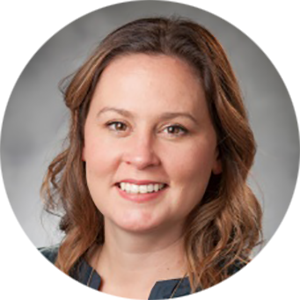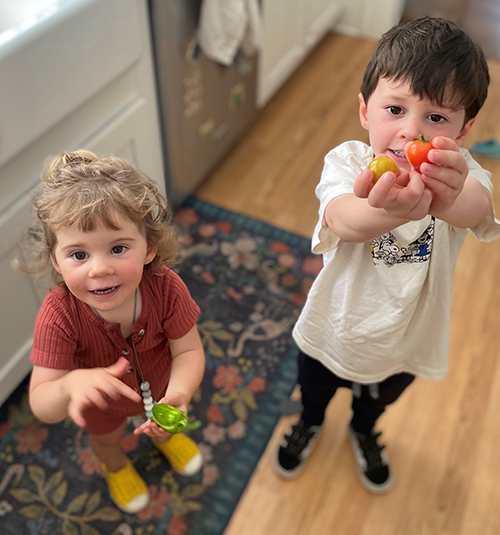
This week's Faculty Spotlight shines on Debra Lugo, MD, assistant professor of pediatrics in the Division of Infectious Diseases. Lugo talks to us about her work as a Pediatric Transplant Infectious Diseases attending and program director for the Pediatric Infectious Diseases fellowship program. She also discusses her research focused on infections in immunocompromised hosts, specifically viral infections and donor-derived infections. She also talks about her perspectives on the biggest current challenges and opportunities in the field of pediatric infectious diseases and provides some valuable advice for trainees.
How long have you been at Duke? How did you decide to come here?
I am about to celebrate my 4 year anniversary with Duke. I moved here after finishing fellowship at UCLA. I was looking for a transplant ID job in academia, and a great position opened up at Duke. Location was also very important to us. We had just had our first child, and I was very ready to leave LA and be able to spend less time in my car and more time with my family. We were specifically looking to move to a family friendly city like Durham.
What are your current responsibilities in the Department of Pediatrics? What does your typical day look like?
I am a Pediatric Transplant ID attending, and I am also Associate Program Director for the Peds ID fellowship. On my typical day, I would be attending on the transplant ID service. My day would consist of rounds with the fellows and the other subspecialty teams who are involved in the care of our pediatric patients that are receiving either solid organ transplants or bone marrow transplants. During rounds we make recommendations about the post transplant prophylaxis to prevent infections and help guide management when infections do occur in these patients. It’s lots of rounding and discussing patients, and after rounds, the fellow and I spend time each day reviewing literature or guidelines to help inform our decisions and teach the fellows. To do this job, a person has to like talking to lots of providers and lots of families and answering questions. Beyond that, it is always intellectually interesting, and I get to work with lots of different teams all over the hospital.
How and when did you initially become interested in medicine? What made you decide to pursue a career in pediatric infectious diseases in particular?
I was always interested in medicine and science. As a kid, I was always working on some kind of science experiment, which probably drove my mom crazy with all the mess! I decided on pediatric infectious diseases during my rotations in medical school. Pediatrics was the obvious choice. And infectious diseases was the most exciting subspecialty to me. The ID physicians seemed to know a little about everything and get to work with kids of all ages with all different pathologies. During my rotations in residency, my ID attendings loved to teach, and we would talk about cases for hours, and I loved every minute. I also loved that there were so many treatment options and often the ability to cure or at least arrest the progression of infections.
What do you see as the biggest current challenges and opportunities in the field of pediatric infectious diseases?
Well at this point in time, the biggest challenge is COVID. Specifically, the concern for new variants and low vaccination rates, but this could also be our biggest opportunity. We can learn how to talk about the science of vaccines and how to educate vaccine hesitant patients and families and use those skills in future pandemics and to combat misinformation. Vaccine hesitancy will always be around--I think we need better communication tools to address it.
Can you tell us about the research you are currently involved in?
My research interests are infections in immunocompromised hosts, specifically viral infections and donor-derived infections. Currently I am working on a project describing the impacts of HHV6 infection and treatments in pediatric hematopoietic stem cell transplant recipients and also have projects involving adenovirus infections and CMV in these populations. This year, I also worked with Dr. Matt Kelly on his BRAVE kids study, which is a prospective cohort study of children and adolescents with a SARS-CoV2 close contact exposure, collecting samples for a biorepository. I was drawn to collaborate on that project due to the pressing needs of the pandemic, and a desire to help find information that may lead to solutions during a time when a lot of other non-critical research projects were being put on hold.
Who was your most significant mentor and what knowledge did you gain through collaboration?
My most significant mentor so far, was my fellowship research mentor, Dr. Paul Krogstad, who taught me about virology in a basic science lab, through our project studying enterovirus D68, compared with other picornaviruses. I learned so many basic skills, and it ignited my interest in virology. I expect to have many more mentors throughout my career though and recently have had great career mentorship from Dr. Steinbach here at Duke.
What do you enjoy most about your work?
The patients, especially when they finally get to go home! But I also deeply enjoy working with the fellows and other trainees. They are so impassioned about medicine and eager to learn. I love watching the fellows evolve into independent and confident ID attendings, each finding their own path.
Do you have any advice for trainees?
Don't be afraid to fail. The failures will teach you as much if not more than your successes. Going through school we are used to striving for perfection, but there is no perfection in this stage of your career. Failing only means you tried. Ask any great researcher, and they will tell you they have more grants denied than accepted, and more rejections of papers than accepted for publication. That is normal and expected, and teaches you valuable lessons. Similarly, in your clinical thinking, you should always try to trust your clinical judgment and make decisions independently before presenting to the attending. They may disagree but they will never fault the trainee for the effort. And I would apply this to your careers as well--it's ok to change paths or take a different direction if your aren’t satisfied. Great careers can have a winding path.

What passions or hobbies do you have outside of Duke?
Currently my kids monopolize all my free time. We always have lots of projects. This year, we started a garden and grew some veggies. Unfortunately, the kids are two and four years old and very impatient, so they always pick them too early. They are so excited about it that I don't have the heart to tell them no! So we only grow tiny veggies! We also do a lot of hiking and traveling. This year we couldn't take many big trips so we went to my dad's farm in Mills River and helped with the bee keeping and mules there. The kids mostly just eat the honey and feed the mules treats! It was a great escape during the pandemic.